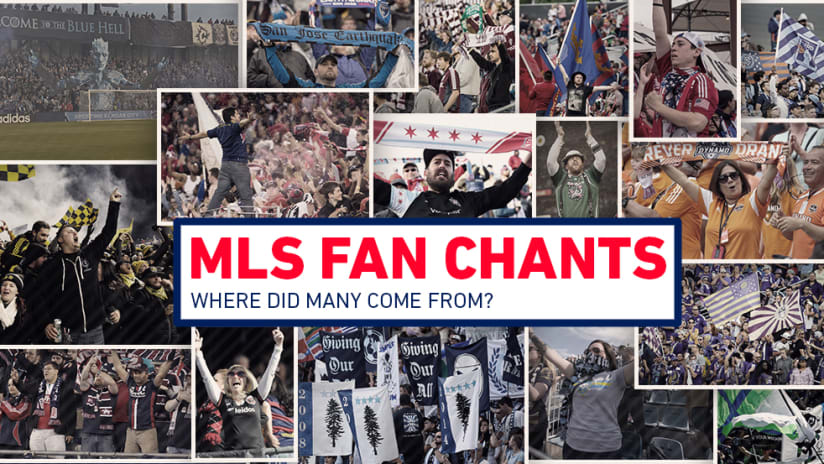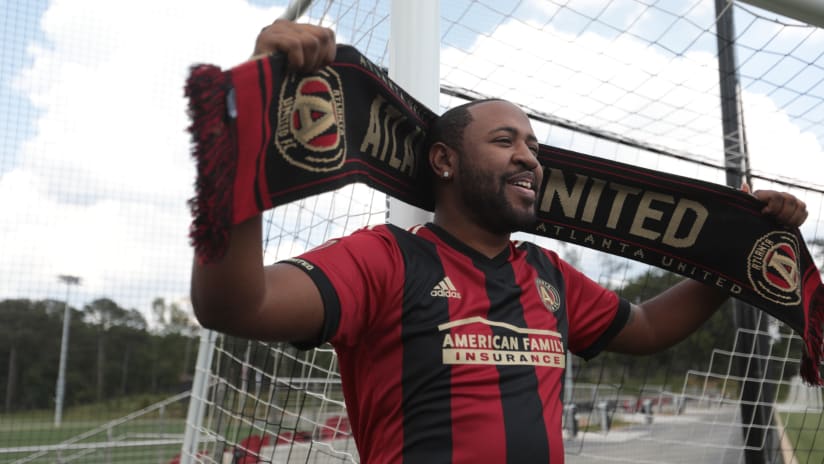Go to Gillette Stadium for a New England Revolution match, and you might hear supporters from the Midnight Riders and the Rebellion belt out “Glory Glory Revolution.” The chant goes so far back in MLS history that it still includes a line about “throw[ing] the [Tampa Bay] Mutiny overboard,” even though the Tampa team hasn’t existed since 2001.
Then, if you go to Dick’s Sporting Goods Park in the suburbs of Denver, you’ll likely hear “Glory Glory Colorado,” using the same “Battle Hymn of the Republic” melody and cadence. This version, though, declares that fans “stand behind the Rapids” and will go marching on.
Both of these, though, might sound familiar to fans of English Premier League side Manchester United, who have their own “Glory Glory” chant. And that’s just one example of many MLS fan chants’ global roots.
“When it comes to football chants,” says John Knox, spokesperson for the Vancouver Southsiders, “there's certainly a tremendous amount of recycling throughout the world from one club's supporters to the next. It seems to be an inescapable reality, especially in MLS, where supporters’ culture is essentially in its infancy in comparison to other nations.”
The Southsiders and other Whitecaps fans know this well, having gone around the globe to assemble their chants. They include a modified and translated-to-English version of Chile’s “Vamos Chilenos,” and an adaptation of “Tifosi Melbourne” from Australian club Melbourne Victory FC.
Their pre-match presentation chant, “White is the Colour,” gets played over the PA to unite BC Place in song. But that hails back a few decades in both Whitecaps and global soccer history—it borrows from Chelsea’s “Blue is the Colour,” which was popular back in the 1970s when the ’Caps were forging their Cascadia rivalries in the NASL.
Across Canada, Toronto FC supporters have also looked to other lands for some chants. Mike Langevin, the longtime Red Patch Boys member known as “Red Patch Drummer” in TFC fan circles, notes one in particular. The TFC Massive chant – “Qu’est ce que vous chantez” – is a call-and-response in French, adopted from French supporters of RC Lens. TFC’s version originated with supporters group U-Sector in 2007.
Then there’s “Oh When the Reds,” which draws from American folk classic “When the Saints Go Marching In.” In world soccer, the New Orleans song is associated with Southampton fans in England, whose team is also nicknamed the Saints.
D.C. United, by virtue of having supporters’ groups active even before the team first took the field in 1996, can boast some firsts in adaptations. According to Barra Brava member Jay Igiel, that supporters’ group is the first to bring a version of the ubiquitous “Vamos” chant to MLS. And as you’d expect, the team’s “Barra Brava” chant is one of the most enduring Spanish chants for a group that specializes in those.
But they also look to other continents besides South America. Along with their fellow United fans in Screaming Eagles, they’ve developed a version of the “Oh! Pilsung Korea” chant that South Korean fans showcased for the rest of the world at the 2002 World Cup.
They’ve also looked to some well-known European chants for inspiration. One of these, “Wings of an Eagle,” is best known among fans of numerous English clubs (and some MLS clubs) as “Wings of a Sparrow.”
The Screaming Eagles’ Paul Sotoudeh notes that United fans first learned the chant at a get-together for league-wide supporters at D.C.’s legendary Lucky Bar in the lead-up to MLS Cup ’97. Sam Pierron, the Kansas City fan largely responsable for the creation of the Supporters’ Shield, won a chant contest with it.
The Screaming Eagles, in turn, thought it was a perfect summation of their feelings about opposing fans. (For the uninitiated, it crudely imagines what freshly fed birds might do while flying over them.)
Empire Supporters Club, created even before the MetroStars (or the league) were officially announced as a team, also boast a long history. Some of the chants for which they’re best known originate close to a decade ago, when the team they support was in the process of transforming from the MetroStars to the New York Red Bulls.
The entire South Ward chants “We Love You” to start matches, for instance. That came to ESC members through fans who’d trekked to the 2006 World Cup in Germany, and in turn learned it from St. Pauli fans, according to ESC member Steven Ferrezza. That chant originally derived from “I Will Follow Him”, Little Peggy March’s 1963 hit, but with a touch of the KC and The Sunshine Band’s 1974 disco smash “That’s the Way (I Like It)” finding its way in there as well.
But ESC put their own twist on it, jettisoning the KC section and giving it a slightly different ending – and it, in turn, spread back outwards: Some ESC members note their version has spread to other MLS fan bases, as well as the American Outlaws and back to some European clubs.
Then there's "Sos Cagon Washington," an English-language reinterpretation of “Sos Cagon,” a song that River Plate fans in Argentina use to taunt rival Boca Juniors. (MetroStars fans initially adopted it to have something untoward to sing to D.C. United.)
“Call to Arms” is another South Ward staple. The Red and Black Bloc, an Australian supporters group for Western Sydney Wanderers, originally created it. That group took the melody and some of the lyrics from Supertramp’s “Logical Song,” one of the most omnipresent hits from 1979, to create the original.
NYCFC fans, for their part, have taken one notable chant from overseas, and it’s currently theirs and theirs alone. Naturally, it’s the “Illa, Illa, Illa, Villa Maravilla” chant that Barcelona fans created for striker David Villa:
One of the most unusual crossovers from pop music to soccer chant this side of “Seven Nation Army” comes from 1980s English synth-pop pioneers Depeche Mode. Their seminal hit “Just Can’t Get Enough” became a chant for supporters of Scottish Premier League vanguards Celtic. It then spread to English and Welsh teams, including Swansea’s faithful rendition of the original, as well as Liverpool’s tweaking of the chant, when Luis Suarez still played for them, to “Just Can’t Stop Suarez.”
In MLS, “Just Can’t Get Enough” has become a favorite of both Philadelphia Union and Colorado Rapids fans. According to David Wegner, leader of the Rapids supporters’ group Centennial 38, it’s the second-most popular musical chant the team has going. The first, he says, is a punk-rock version of John Denver’s “Country Roads Take Me Home.”
Adam Sell of the Midnight Riders says Revolution fans enjoy a particularly eclectic mix of chants based on pop music. But rather than looking overseas, they rely on favorite sons like Jonathan Richman, who conveniently wrote a chant-ready “New England.” The J. Geils Band’s “Centerfold,” meanwhile, is a little less chant-ready, but Revs fans still make it work.
They have also turned to England for chants, including “We’re All Part of Heaps’ Army,” an update on “We’re All Part of Nicol’s Army.” They adopted that back in 2002, when Scottish national player and Liverpool legend Steve Nicol became the Revs’ head coach for a decade.
And the aforementioned “Glory Glory” goes back to the very origins of the club. Sell believes that a United fan might have suggested it, and because the meter works so well with Revolution, the chant became embedded in the supporters’ repertoire.
Today, though, Sell thinks it would be impossible to adopt a chant associated strongly with a single Premier League club. He says Revs supporters, for instance, are divided in their support of various foreign teams.
“Anyone suggesting ‘You’ll Never Walk Alone’ would get slapped,” he joked. Though Fenway Sports Group owns both Liverpool and the Boston Red Sox, Sell says that there’s less Liverpool/Revs crossover than outsiders might assume.
And even so, he says, “[They] wouldn’t want to adopt a chant that’s that iconic to one team.” Or even, as the recent Hillsborough inquest verdict has reminded us, one that’s transcended club identity to become sacrosanct.
With the expanded exposure to global soccer that American fans are getting from new TV contracts, the potential for MLS fans to be exposed to new chants has grown even larger than before. But the opposite is also true—so maybe, a la ESC’s “We Love Ya,” it won’t be long before more American creations find their way back overseas.













